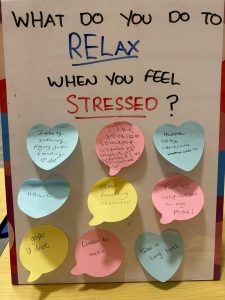Stressful Statistics
April is stress awareness month. Many people take this to mean work-related stress – and that is an issue. 1.8 million working people suffering from a work-related illness, of which 875,000 workers suffer work-related stress, depression or anxiety.
Source: Britain 2022/23 https://www.hse.gov.uk/statistics/overview.htm

The CQC’s state of care report highlights that Social Care Workers are stretched and stressed by lack of resources and high levels of demand.
Meanwhile, among unpaid carers, who are estimated by the UN to meet 75 – 90% of care needs, carer burn out is also real. More than three quarters of all carers (79%) feel stressed or anxious, half (49%) feel depressed, and half (50%) feel lonely.
Source: The State of Caring Survey 2023
Communication skills and stress can be related. Sometimes when stressed, our ability to process or produce spoken language is impaired. And if it isn’t easy to communicate or if we are not understood, it is stressful. All of Include’s projects and training aim to build communication bridges, so that this stress is reduced for everyone involved.

We welcome carers and support workers to our projects and they tell us that things like our Stroll and Sign wellbeing walks help them to feel less isolated and less stressed as a carer.
Being in nature with a supportive group boosts everyone’s mental wellbeing.
You can watch our video about How our Stroll and Sign project helps people. Why not come and join us?
Honest Insights
We asked a friend who is a full-time carer to share his experiences of stress and ways to help manage it. Here is what he said:
“I have always used the word stressed and stress for as long as I can remember, I’ve always felt anxiety socially, About everything really, being late, thinking that I need to be doing something better with my life or thinking that something bad might happen. In December 2020 something really bad did happen, my son had a brain tumour removed and then suffered from severe complications that meant that he needed me to be with him all day every day to care and help him to rehabilitate.
So, I learnt that what I was worried about before paled into insignificance compared to this new life. The stress of keeping someone alive 24/7, the stress of making sure they get the right calories, the right water intake, that they don’t have a seizure, they don’t hurt themselves, to try and get them out into social situations when they don’t want to get out of the car, the dread of impending scans and discussions with Drs to know if the tumour comes back, and a million more tiny stress points in the day while trying to operate as a normal family with my wife and daughter as well.
How do I deal with stress? Well, it is there and it won’t go away and most of the time I can handle it with the occasional ‘dummy spit’ where I have to take a few minutes to breathe. I ensure that I exercise at least 3 times a week, playing Football with a team helps as that is a great place to talk to others who are sometimes going through tough times themselves, but also to talk about Football and tactics that our crumbling bodies probably can’t execute come match day. I also go for a walk around the block on evenings where I need to get my thoughts straight.
My son is currently at a Neuro rehab centre in Surrey with a packed schedule of therapy and School sessions, so I am flat out getting him ready, getting tosessions on time, feeding him etc etc, after our first week we reviewed everything with the team here, and one of the key goals of this placement is for me to look after myself. Easier said than done, but very important because if I suffer then everyone suffers. It’s hard to let go, but I’m doing it step by step, and my son is responding well to me taking a step back at times. I’m also finding it really useful to chat to others who are in a similar situation, there is no agenda, we are all in tough situations and can just talk straight to each other. So, another way to manage stress is to speak to others, understand where you can step-back and that you may not be that vital all the time – the World will still turn without you.
It’s difficult to manage stress. Try to find time away from your day to day to do something you enjoy, chat to people wherever you are, walk round the block, maybe get some professional help if you feel ready, listen to your close ones if they say they are worried about you, there’s always some way to solve a part of the problems you are facing.”
Other things that can help

We asked some of our Include Choir members, support workers and volunteers to share how they manage their stress. Here are some examples of what they said:
“I relax by gardening, playing guitar and reading.”
“I like to talk to someone, listen to music or watch a film to cheer me up”
“Headspace and yoga. Listen to music. Exercise.”
“Music”
“Turn off notifications on my phone!”
“Listen to music”
“Go for a drive”
“Deep breathing exercises”
“Take a long bath”
Easy Reads
Our Champions Group (people with lived experience of communication needs) has produced two relevant and helpful Easy Read resources – one about mental wellbeing and the other about physical wellbeing.

You can download them for free here:
There are audio versions on SoundCloud too:

Communications, Fundraising and Partnerships Lead
